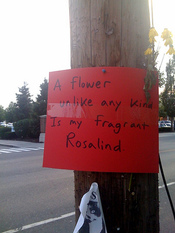In this pastoral play, love is perceived almost like madness provoked by the Forest of Arden. It has the magic influence of freeing the characters, after enchanting them.
ÃÂThe movement from court to Arden is not a sudden jump but a gradual transition, ÃÂthe way of a mindÃÂs journey, a mental voyage of discoveryÃÂ to ÃÂa recognition of selfÃÂ, a ÃÂnew experience of the value of feelingÃÂ from which the characters return to a court which will never be the same again.ÃÂBernard Shaw observes that ÃÂin ShakespeareÃÂs plays the woman always takes the initiativeÃÂ . But what he also observes is that RosalindÃÂs stratagem of disguising to charm Orlando is contrasting with OrlandoÃÂs femininity, if I could use this word. This makes the critic wonder about ShakespeareÃÂs sexuality, but he concludes that the play writer is a normal man. Actually, as critics affirm, ShakespeareÃÂs life is not very accessible to study and it seems to be hidden under veal.
Comparing him to Marlowe, Moliere, Racine, Marivaux, most of the critics agree that ÃÂShakespeareÃÂs characters have a third dimensionÃÂ . The superior insight or superior perception of some of his characters is valorized by their capacity to escape of the play by constructing themselves. And this is what makes Harold Bloom conclude that Shakespeare ÃÂperceived more than any other writer, thought more profoundly and originally than any otherÃÂ . He believes that Shakespeare was capable to create such ontologically different characters only because he was free of any ideology. And his freedom, he manages to transmit it to some of his characters, who seem to think themselves, listening to their own interior voice. This is what makes some of the critics like Tolstoy banish him and accuse him of immorality. But how relevant is TolstoyÃÂs essay? Does Tolstoy really understand Art or he rather judges it through his own indoctrinated religious view? Who has the right to accuse art of immorality? I believe that Art should awake our spirit like ShakespeareÃÂs does, and not censure. Contrary to TolstoyÃÂs affirmation, I would paraphrase it saying that Shakespeare was hardly trying to reveal the truth.
I do not agree with critics who consider this play as a trivial one and that is the reason I choose to write about the complexity of As You Like It. I want to insist on the fact that Rosalind is a superior character, who controls everything; Shakespeare even seems to live in her hands the final of this play, but everything is calculated to produce an effect on the public. And this effect is essential and reveals the appearance of triviality, transfiguring it into a way to complexity and self-discovery of the inner voice.
Beginning with the title, open minded lectors can find it very peculiar. It opens many interpretation perspectives on every spectator. I personally consider it in the sense of more than an opera aperta, opened to every interpretation for every level, but also offering itself to new possible interpretations. Rather than the point of view suggested by Rosalind it all depends on your point of view I prefer to consider it in correlation with the freedom of Arden. I consider that it also has the capacity of irony that awakes the spectatorsÃÂ minds and suggests them new questions and inquiries of their own profoundness that they do not access every day. Spectators are free to multiple interpretations.
As Ralph Berry observes, Duke Senior even exiled, enjoys a position which seems to be psychologically immune to threats. He has the appearance of an ideal philosopher and moralist who cannot be restrained from his meditating activity. The usurpation becomes an emblematic metaphor for the entire play. Spectators should wonder if the world isnÃÂt full of usurpations and masks which rule the entire world. The simulacrum should be obviously de-masked by this play.
ShakespeareÃÂs characters are opened to multiple perspectives and that is what makes the public participate to the play. He touches the limits of human and even tries to get out of these limits, by using the masque on the stage and creating a play-within-a-play. The gradation of intensity makes some parts of the play seem more real than others. Spectators are turn into accomplices, but this fiction has also the role of revealing the real face of acting: spectators can discover themselves as actors playing on the lifeÃÂs scene, according to roles attributed by their social position and responding to social and religious conveniences. Shakespeare also distinguishes and relieves the sexual determination of the characters, and he mocks social order by inversing the sexual characters: Rosalind is disguised like a male, and she acts like one. Orlando instead looks feminine in his role.
I agree with Ralph Berry considering Rosalind as a dual figure since Ganymede can be considered as the other one expressing self of her. In her case, the personality conflict is obvious between being man and women, between lying and telling the truth, but she has the force to keep an equilibrate attitude and resolve all the problems. Celia is the only one who can act like her and Rosalind respects her and almost sees her as an equal. At least, Celia is the only one that Rosalind does not lie to and the only one she can tolerate. Even for Orlando she might have moments of intolerance, keeping a critical attitude regarding him. Even if she is in love with him, she is able to pretend in front of him and this ÃÂlove at first sightÃÂ seems to be rather a ÃÂseducing processÃÂ.
PhebeÃÂs love for Rosalind - Ganymede is a reverse of her own dominating female role. She is in this way punished and satirized, by being seduced by woman. I consider this peculiar way of changing man and female roles a proof of ShakespeareÃÂs elevated level of understanding psychology , rather than a simple procedure for creating satire (as critics consider). I reflect on the possibility of the hypothesis that he understood what modern science and genetics discovered recently: the complexity of the human psychology, regarding the percentual composition of male and female chromosomes which make the gender differences. It seems that we all have both male and female chromosomes, but what is that makes our gender identity? Rosalind seems to prove us an important percentage of our gender identity depends on the education that we receive and of the social context. It seems almost obvious that it is the society who establishes and differences the attributes of man and women more than genetics does. This fact should prove to the spectators how enlaced they are in this society and reveals them a way for trying to analyze their inner voice and wonder who they really are, as ShakespeareÃÂs characters do.
The masque is no longer frivolous in this play. Changing sexual identity, Rosalind experiences a new way of freedom. It even makes us wonder whether her ontological identity is a male or a female one, or maybe in another perspective she should be free of a sexual identity, as she is free in her spirit.
Irony and mockery transform this apparently trivial play into a deep analysis of the human mind. Not only we can analyze Rosalind and Celia disguising and changing attitudes and points of view about love, but even more, satire opens our minds to a critical attitude, which prepares us as spectators to identify our own complexes on the stage. It functions as a psychoanalytical procedure. Shakespeare can be considered as a precursor of the psychoanalysis.
ÃÂOn some level, Freud understood that Shakespeare had invented psychoanalyses by inventing the psyche, insofar as Freud could recognize and describe it. This could not have been a pleasant understanding, since it subverted FreudÃÂs declaration that I invented psychoanalysis because it had no literature.ÃÂActually, literature and psychoanalysis are in a deep relation of interdependency. Modern therapies also include therapies like assisting to a special theatre play or acting your own role on stage under the psychiatrist direction, in the purpose of escaping your inner complexes and freeing.
Bibliography:- Berry, Ralph ÃÂ No Exit From Arden, in Modern Language Review, 66 / 1971- Bloom, Harold ÃÂ The Western Canon, Papermac / Macmillan Publishers Ltd., London, 1996- Eliot, T.S. ÃÂ The Sacred Wood, Essays On Poetry And Criticism, Ed. Methuen & Co LTD., London, 1967- Latham, Agnes (ed.) ÃÂ As You Like It, Arden Shakespeare, Methuen & Co Limited, London, 1975- Leggatt, Alexander ÃÂ ShakespeareÃÂs Comedy of Love, Methuen, London and New York- Shaw, Bernard ÃÂ Prefaces, Constable and Company Limited, London, 1934-Wells, Stanley (ed.)ÃÂ Shakespeare, A Bibliographical Guide, New Edition, Clarendon Press, Oxford, 1990





